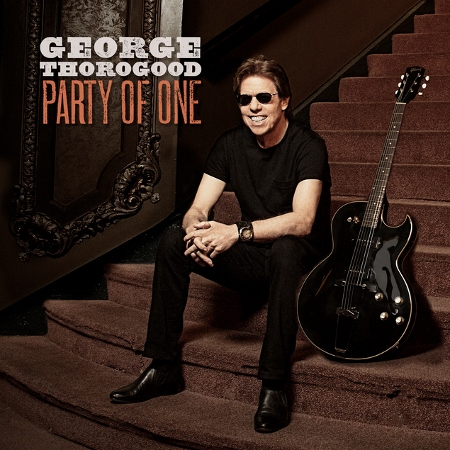George Thorogood certainly isn’t the first rocker to make an album of all blues and roots music (see, for example, Big Head Todd & the Monsters, Gary Hoey, and this recent announcement from Black Stone Cherry), nor is he really the last you might expect to do so, considering the success he’s had over the years with his covers of songs like John Lee Hooker’s “One Bourbon, One Scotch, One Beer”, Bo Diddley’s “Who Do You Love?”, and Elmore James’ “Madison Blues”. But what might surprise some about Thorogood’s brand-new album is that he chose to record the project in the same manner in which he’s made it known he likes to drink: alone.
 The first solo album of Thorogood’s more than 40-year career, Party of One marks a true back-to-the-roots approach for the singer and guitarist who has sold some 15 million albums worldwide and performed more than 8,000 live shows, not only in that Thorogood began his career as a solo acoustic musician, but also in both his return to Rounder Records, the label on which Thorogood first signed back in 1976 and recorded his first three hit albums, and reunion with producer Jim Gaines (John Lee Hooker, Luther Allison, Stevie Ray Vaughan), who produced several of Thorogood’s earlier albums.
The first solo album of Thorogood’s more than 40-year career, Party of One marks a true back-to-the-roots approach for the singer and guitarist who has sold some 15 million albums worldwide and performed more than 8,000 live shows, not only in that Thorogood began his career as a solo acoustic musician, but also in both his return to Rounder Records, the label on which Thorogood first signed back in 1976 and recorded his first three hit albums, and reunion with producer Jim Gaines (John Lee Hooker, Luther Allison, Stevie Ray Vaughan), who produced several of Thorogood’s earlier albums.
Thorogood’s response to the self-posed question of “what’s the one thing you’ve always wanted to do but haven’t done yet?”, Party of One is described in press materials as “Thorogood’s long-awaited tribute to the artists that shaped his musical consciousness” and features the rocker’s unique, mostly acoustic, takes on 15 tracks including blues classics from Hooker, James, Robert Johnson, Willie Dixon, John Hammond Jr., and Brownie McGhee; country numbers from Hank Williams, Johnny Cash and Gary Nicholson; and gems from The Rolling Stones and Bob Dylan. Each of the songs features Thorogood entirely on his own — including playing slide guitar, Dobro or harmonica on some numbers — as recorded live in the studio with minimal overdubs.
The album starts on the thick yet patient slide sounds of Robert Johnson’s “I’m a Steady Rollin’ Man”, followed shortly (after a breezy country detour in the form of Gary Nicholson’s tender “Soft Spot” about helping people on hard times) by a shuffling, even rawer “Tallahassee Women” (John Hammond Jr.) that allows Thorogood his first real solos on guitar, with his familiar deep, gravelly voice lending itself quite nicely to such blues numbers, while a fast-chugging, harmonica-laced “Wang Dang Doodle” (Willie Dixon) is presented with much milder, quieter vocals than you might expect from the rocker, as is also the case with his slowed, almost serene take on Elmore James’ “The Sky is Crying”.
James’ “Got To Move”, on the other hand, gets a bit more of the classic Thorogood rocking workout, with the Delaware native also delivering a trio of John Lee Hooker tunes in “Boogie Chillen”, a gritty “(Don’t Mess with) The Hookers” that isn’t referring to the girls, but rather John Lee and his cousin Earl, and a faster-tempo revisiting of “One Bourbon, One Scotch, One Beer” that Thorogood actually recorded back in 1999.
Thorogood bridges the blues and country nicely on Brownie McGhee’s (who, along with his longtime musical partner Sonny Terry, provided Thorogood with his first opening gig before Thorogood went on to play with the likes of Hound Dog Taylor and Robert Lockwood Jr.) “Born with the Blues”, with Thorogood delving a bit deeper into country territory on the aforementioned “Soft Spot”, Johnny Cash’s “Bad News”, and Hank Williams’ “Pictures from Life’s Other Side”.
The Rolling Stones’ creeping folksy ballad “No Expectations” allows Thorogood to display perhaps the broadest vocal range of any track, with Thorogood also giving Bob Dylan’s “Down the Highway” a bluesy, John Lee Hooker-ish treatment. And blues fans will be happy to learn that the CD version of the album also includes a terrific bonus track of Robert Johnson’s “Dynaflow Blues”.
Longtime Thorogood fans who may be questioning whether a largely acoustic, solo recording from the high-energy showman comes across as boring need fret not; despite the raw, stripped-down nature of the project, Thorogood attacks these numbers with the same intensity and appreciation he has his prior recordings. We didn’t see anything in the press materials to indicate whether, like his drinking, Thorogood prefers to record by himself, but it sure does make for a nice change, and one that will no doubt lead many blues fans back to check out some of Thorogood’s other bluesy work over his career.
